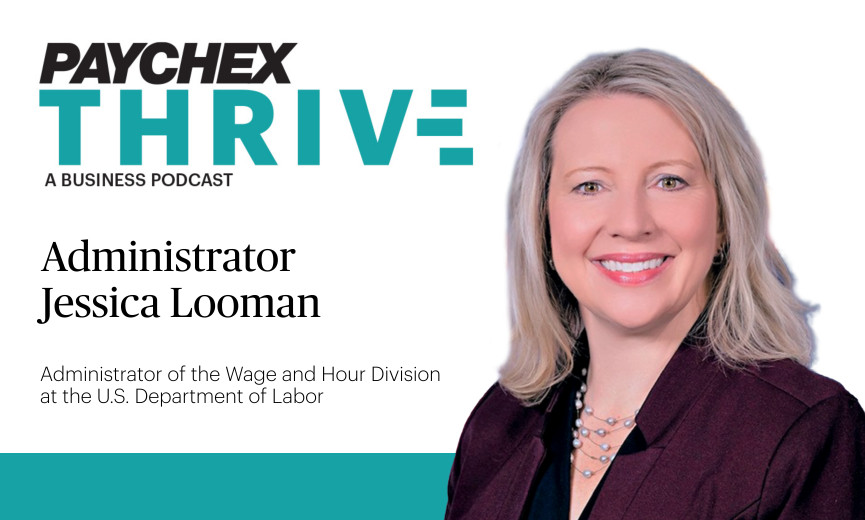Transparencia de las comisiones de las tarjetas de crédito en Nueva York, la PFML podría ampliarse en Nueva Jersey y Pensilvania, y fondos de reserva

Podcast •

Resumen
If your business has been charging patrons in New York a greater amount for credit card usage than the rate you’ve been asked to pay by the credit card company, that practice must stop now. A NY state law goes into effect calling for transparency on surcharges and also includes notification requirements. Gene Marks gives the law a thumbs-up. He also talks about how N.J. and Pennsylvania are pushing the expansion of Paid Family Medical Leave toward impacting more smaller businesses and shares a few thoughts on the creation of emergency savings accounts for employees. Listen to the episode.
Ver transcripción
[Gene Marks, host]
Hey, everybody, it's Gene Marks and welcome to another episode of the Paychex THRIVE Week in Review podcast. This is where we take a few items from the news during this week and how they affect your small business, and we talk a little bit about how they affect your small business. So, hopefully, you can get some good advice and feedback as you walk away from this. So, let's get to the news this week.
The first comes from New York state, and get ready, the governor of the state has announced a new law this past week about credit card surcharges. You know how annoying it is when you go into a restaurant or a business and you use your credit card and they tack on a surcharge to the fees? You know, they say “Well, you're going to use a credit card are going to have to pay an extra amount.” Or they you don't even hear about it at all until after the fact, and it does kind of annoy a lot of people. Well, it annoys me.
Well, the governor of New York has taken some action on this. She signed a law back in December, which is taking effect shortly, that will provide greater transparency and protections to consumers, and it will do so in two ways. It will limit credit card surcharges to the amount charged to the business by the credit card company. So, if say, the restaurant is getting charged 2% by the credit card company, they can't charge you and me 2.5%. And the second thing is that it's requiring businesses to post before checkout the total price of an item or service inclusive of the credit card surcharge or a two-tiered pricing option, which requires the credit card price to be posted alongside the cash price.
So, according to New York's governor, New Yorkers should never have to deal with hidden credit card costs, and this law will ensure individuals can trust that their purchases will not result in surprise surcharges. Transparency is crucial in building trust between businesses and communities, and now patrons will be empowered to budget accordingly.
I like this rule. I think it's silly to charge extra for credit card fees. I think you can build in the pricing into your prices and not have to, you know, risk disgruntling some of your customers. If more businesses did this, then governments wouldn’t have to take these kinds of actions to now require that and set rules for all the businesses.
So, bottom line is this if you're running a business in New York state and you are using, you know, you're having different surcharges depending on whether somebody uses a credit card or not, you now have new rules to follow.
The next news comes out of New Jersey. There is a New Jersey Family Leave Act. Last week, according to WHYY.org, the New Jersey State Assembly passed a measure expanding the current law to include job protections for workers who take family leave at – are you ready – smaller businesses.
Under current law, New Jersey employees can take up to 12 weeks of time off to bond with a newborn baby or adopt or foster a child or care for a sick relative. The Family Leave Act guarantees jobs safety and security as long as they are at least 30 employees in the workplace.
Well, guess what? This new law that was passed by the assembly will expand it to include smaller companies. Again, this is in New Jersey. If it becomes law, the measure will guarantee employment, reinstatement for workers taking family leave in companies with 20 or more employees. One year later, the employee reinstatement guarantee goes down to ten or more workers. And 12 months after that, two years from when this law, if it passes or goes into effect, it's going to affect anybody with more than five employees. So, if this law happens and you right now have got five or more employees in the next couple of years, you're going to have to be in accordance with the Family Medical Leave Act of the state of New Jersey.
The legislation will still be approved by the state Senate Labor Committee before it is put up for a vote in the full upper house. So, it's kind of moving forward in New Jersey. It's going to require more businesses, small businesses, to include those Leave Act and, you know, Family Medical Leave Act job protections. So, be aware of that.
And by the way, Pennsylvania is not far behind, because in the same week another article on WHYY.org said that state law could be changing in Pennsylvania in a very similar way to New Jersey. They pointed out that about 66% of workers in the state of Pennsylvania don't have paid family and medical leave benefits. That's according to a U.S. Census compensation survey cited in the article. The article from WHYY.org also cites the Executive Forum of Women, which was created back in the late 1970s. For the past 12 years, they've been debating and have had failed legislations, but now they say there was more bipartisan support than ever to change the Family Leave Act laws in Pennsylvania.
Pennsylvania Democrats are pushing for the change and are expected to introduce the bill in the House and Senate in mid-March. We don't know the details of the bill, but it may very well be very similar to what we saw in New Jersey, which is allowing more, you know, businesses will have to protect jobs and workers if they need to be on leave, and we don't know the size of businesses that will be protected, as well.
So, more Family Leave Act legislation coming both in the state of New Jersey and the state of Pennsylvania. If your business operates there, you want to make sure that you are aware.
Finally, The New York Times reported this past week – again, about employees – that employers can now enroll workers in what's called emergency savings accounts. Starting this year, a federal law allows employers to enroll workers in emergency savings accounts that are linked to their retirement accounts.
Now, while the law is – we've talked about this before, it's SECURE 2.0 – it's drawing attention to the need for rainy day savings, you know? A lot of employers there are kind of pushing back because they say that the rules for setting up these emergency accounts within these retirement plans are clunky, according to some. You know, there's income limitations, for example, and then there's contribution limitations that you can only put up like $2,500 for certain employees. And though employers can help with contributions, they must deposit any match into the worker's retirement account not the, you know, the worker's emergency account. So, it's complicated.
Right now, this law has two main provisions, right? I mean, it's designed to help your workers with any kind of surprise expenses, right? So, it allows employers to automatically enroll your workers in these emergency savings plans, which are sort of tacked on to their 401(k) accounts, right? And secondly, employers can let workers withdraw up to $1,000 a year without penalty from their retirement accounts to cover surprise expenses, right?
So, that sounds all good, but because of these complexities in setting it all up, some employers are resisting. They've said already in a written comments to a survey that was recently published that the time and cost necessary to offer the provisions weren't worth their value to employees. Others objected to linking rainy day and retirement savings, even though one rationale for offering emergency savings accounts is to reduce workers need to tap retirement funds to manage, you know, personal financial difficulties.
So, what am I seeing out there, like in the real world? Most small-business owners help out their employees if they need a couple thousand bucks because they have an emergency at home. I see it all the time. Well, this is doing is not mandating it, but just trying to provide a better vehicle for doing so. But as it turns out, even though now employers can contribute up to $2,500 for these rainy-day funds that are attached now to 401(k) accounts, and employees can take out a $1,000, you know, this is not something that seems to be very popular because it seems to be a little bit too complex.
So, just be aware that this fund does exist, these rainy-day funds. You can now look into a little bit further. Maybe you can talk to, you know, your retirement plan professional and see if it makes sense for you or you might want to continue to just help your employees with emergency funding, you know, if and when the need arises.
That's the news for this week. You've been listening to Paychex Week in Review, a THRIVE podcast. My name is Gene Marks. If you have any advice or help or want to suggest guest, please visit us at payx.me/thrivetopics. We will see you again next week with some more good news that impacts your business. Well, maybe it's not all good news, but it will be news, and I myself will give you some of my opinions and thoughts on it to help you navigate your way around that news. Have a great week. We'll see you soon. Take care.
This podcast is property of Paychex, Inc. 2024. All rights reserved.

 Apple Podcast
Apple Podcast Spotify
Spotify iHeartRadio
iHeartRadio






